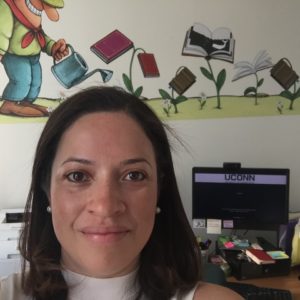An Extension Specialist … What I Never Dreamed When I Was a Kid, or Did I?
Have you ever wondered what exactly an Extension Specialist does? An Extension Specialist is a university faculty member who conducts research, extension and education ― all around the needs of a specific audience. In other words, we work for the growers. I can summarize my role in five activities:
1. Listen to the growers. I could never do my job right without the growers’ feedback. The growers tell me about the pressing issues of the moment, the things they would like to do, their expectations from a state institution, which speakers they like, the stories other growers or vendors tell them, products they have heard about. It is during these conversations that I can grasp what are the education and research needs for my stakeholders. My goal is to listen 80 percent of the time and speak only 20 percent. My expectation is that my 20 percent will offer something new to the grower. Remember that old phrase, “two ears, one mouth” — very appropriate for anyone in Extension.
2. Conduct research. We conduct applied research to advance our industry. Our motto at University of Connecticut Extension is “UConn Extension ties research with real life.” We have to balance between the growers’ needs and our own personal skills and interests. My training is in plant pathology, horticulture and water quality. When I hear the words clogging, water or microbes in the greenhouse, my eyes pop-out! For the grower, that is a problem; for me, a potential research question. It is very difficult for me to hide my excitement when I see clogged pipes. Despite my excitement, my ultimate goal is to solve the problem immediately and, in the long term, prevent from the same problem to happen again. The research projects in my lab are 90 percent in response to real problems observed in commercial greenhouses. We love to solve the puzzle!
3. Team up! The one thing that is clear in our industry is that we all need one another. We are lucky to work in an industry in which people are willing to collaborate. We rely on Extension agents, other researchers, students, growers, industry, government, etc. The network helps us give a better service to our growers. We are able to bring the best person on a specific topic to help fill that gap in knowledge.
4. Communicate. The core principle of Extension is to translate science to advance the agricultural industry. In the past, Extension would generate and

distribute their own materials. We still do some of that that, but to a lesser extent. Now we rely on partners like GPN magazine to help us spread the word of our findings (it all goes back to the network). We also fly around the country sharing what we know and learning from others. It’s a never ending learning process.
5. Train the future specialists. I think this is one of the most important roles I can play today. Almost every time I visit a grower, they ask me for upcoming trained students. Automation may replace labor personnel, but it will not replace the thinking minds behind planning and important decisions. I think training students is the most difficult, but also the most gratifying, part of my job.
The role of Extension has evolved, but the core principles enacted since the foundation of land-grant universities in 1862 in the Morrill Land Grant College Act by the 37th U.S. Congress remain alive.
It is true; no kid ever said, “I want to be an Extension Specialist when I grow up.” Nevertheless, I have heard many kids saying they want to be heroes (listen and help others), they want to be magicians (create new things with science), they want to hang out with their friends (team up!), and they would also like to be teachers (train the future). Kids might not know the Extension Specialist term, but they know what they want.


 Video Library
Video Library 




















